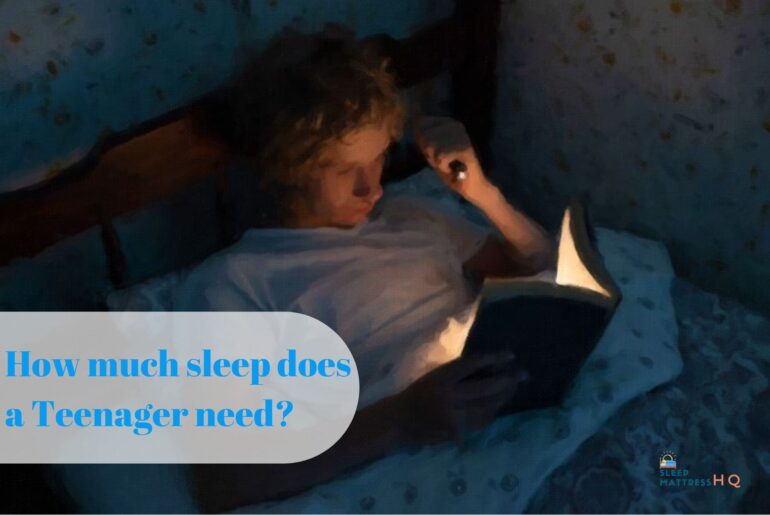Disclosure – We rely on reader support to run SleepMattressHQ.com. If you purchase products using our links, we may earn a commission. Click here to read about our process.
Teenagers require a solid 8-10 hours of sleep each night, but recent studies reveal that the majority of teens are sleep-deprived.
As schools begin early and schedules fill up with activities, a restful night’s sleep has never been more important.
Many teens struggle to get up in the morning as they stay awake late at night, leading to a vicious cycle of late starts and late bedtimes.
This sleep pattern can have a serious impact on physical and mental health, causing parents to become increasingly concerned about their child’s well-being.
Most teens are undersleeping when they need more sleep. In an age where mental health awareness is a top priority, it’s essential that we prioritize restful sleep for the next generation.
How much sleep does an average teenager get?
A teen on average is sleeping for around 6 to 7 hours. It can lead to irritability, mood shifts, sleep disorders, and cognitive decline if there is chronic sleep deprivation.
During adolescence, teenagers undergo numerous hormonal changes. As a result, behavior changes and moods are unpredictable. Sleep deprivation can further aggravate the situation.
Further, sleep gets delayed when puberty hits because of changes in the biological clock and circadian rhythm.
How much sleep does a Teenager need?
Here are the recommended sleep durations for school-going teens according to the National Sleep Foundation (US).
| Age | Recommended | May be appropriate | Not recommended |
|---|---|---|---|
| School-aged Children 6-13 years | 9 to 11 hours | 7 to 8 hours 12 hours | Less than 7 hours More than 12 hours |
| Teenagers 14-17 years | 8 to 10 hours | 7 hours 11 hours | Less than 7 hours More than 11 hours |
| Young Adults 18-25 years | 7 to 9 hours | 6 hours 10 to 11 hours | Less than 6 hours More than 11 hours |
How does Sleep Deprivation affect the teenage brain?
Like others, teenagers need enough sleep. Insufficient sleep can lead to changes in the functioning of the brain. It affects their learning ability and memory.
Behavior
Sleep deprivation makes a teenager develop behavioral problems. They start making irrational and impulsive decisions. It has been seen that they tend to indulge in risky behaviors like rash driving, lack of patience, irresponsible sexual behavior, etc.
Cognitive Decline
One of the most common signs of lack of sleep or sleep deprivation is the ability to think rationally and clearly. There will be signs of foggy thinking. The ability to focus attention and recall information will deteriorate. Academic performance can also be affected by all of these factors.
Driving Issues
Reaching a certain age means your teenager can now legally hit the road, but that also means it’s time for parents to be extra vigilant.
Sleep deprivation can negatively impact a teenager’s ability to think quickly and respond quickly in an emergency situation while driving.
The prefrontal cortex, which is responsible for decision-making and thinking, can be severely affected by sleep deprivation.
Unfortunately, many teenagers tend to party late into the night and then drive home, putting themselves at risk of drowsy driving due to alcohol and lack of sleep.
As parents, it can be a difficult challenge to make them understand the dangers and find a solution that works for everyone.
How can Teenagers Sleep better?
Here are a few tips that can help teens sleep better.
Limit screen time
To increase sleep time, reduce TV viewing time, play video games, and interact on social media before bedtime. This also helps in reducing the exposure to blue/white light that hampers the production of melatonin.
Avoid alcohol
Non-alcoholic beverages are any day better. Consuming alcohol at night can hinder the different stages of sleep and you will wake up tired and lethargic.
Avoid caffeine
Caffeine stimulates your body and keeps you awake. Ideally, tea and coffee should be avoided a minimum of 5 to 6 hours before sleeping time. This cut-off time can be less for people who don’t get affected by caffeine.
Sleep Schedule
Develop a regular sleep-wake cycle and sleep routine. Sleeping at the same time and waking up at the same time in the morning makes you feel energetic and attentive throughout the day. It also enhances your ability to focus.
Sleep Environment
Create a comfortable sleep environment. Use a comfortable mattress and pillow so that you sleep without any stress on the body.
Lighting
Avoid bright lights for at least a couple of hours before bed. Bright lights specifically white light hinder the circadian clock. It is advisable to switch to soft warm light in the evening.
Room Temperature
Set a comfortable bedroom temperature. A slightly cool room (between 60-67 degrees Fahrenheit) is the most comfortable and promotes better sleep.
Afternoon Naps
Studies have shown that a 30 to 40-minute nap helps you feel better and reduces fatigue. It also relaxes your body and mind and boosts your performance.
References:

